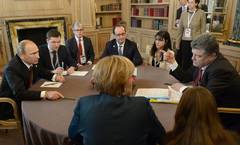(Eurasia Daily Monitor) The most recent Asia-Europe Meeting (ASEM) summit attracted a sizeable crowd of world leaders to Milan last week (October 16–17), but the formal agenda was overtaken by the efforts to manage the violent conflict between Russia and Ukraine and facilitate dialogue between presidents Vladimir Putin and Petro Poroshenko. The European Union sought to deploy every instrument of “soft power” in its arsenal in order to turn the fragile ceasefire in Ukraine’s eastern region of Donbas into a stable compromise. But it failed to find any common ground with the recalcitrant Russia. Putin used the rare summit opportunity to demonstrate his defiance under the pressure of sanctions and ostracism, while hitting at every point of weakness and discord in the joint Western position (Kommersant, October 18). However, what transpired through the disappointment, which German Chancellor Angela Merkel likely felt more than most after devoting two and a half hours to a failed face-to-face with Putin, was the recognition that the EU is, in fact, quite a lot stronger than it is often perceived, while Putin is in a far weaker position than he fancies (Novaya Gazeta, October 18). […]
See the full text © Eurasia Daily Monitor










